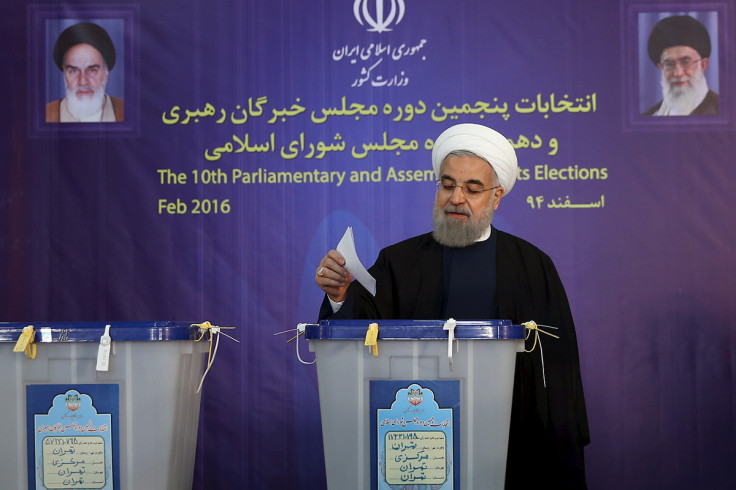Iran elections: Reformists make big gains as Rouhani prepares to bring Tehran in from the cold

Iran is showing signs of deepening its ties with the rest of the world after the latest election results indicated strong gains for President Hassan Rouhani. For the first time, Iran simultaneously held high-stakes dual elections on Friday (26 February) to elect both lawmakers to the parliament and members to the Assembly of Experts, which in turn appoints the country's supreme leader.
But what do these elections mean?
Could a progressive shift be on the horizon?
According to the latest results, reformists have taken all 30 parliamentary seats in Tehran – up by 28 – and have won 15 of the province's 16 seats in the influential Assembly of Experts. This means that conservatives may no longer dominate the 88-member clerical body tasked with picking the country's most powerful person. The current Supreme Leader Ayatollah Ali Khamenei, 76, has reportedly suffered ill-health. Despite this, conservatives retained their seats in both bodies outside the capital city.
Voter turnout was huge, with Interior Minister Abdolreza Rahmani Fazli saying that 60% of eligible voters came out to have their say. That equates to around 33 million Iranians. Khamenei even praised the high turnout in his first comment following the vote, but warned against reformist rhetoric giving off an "illusion of victory".
"I think one of the things that's quite remarkable is the real passion of a lot of Iranians to want to go to the polls," said Bessma Momani, senior fellow at the Centre for International Governance and Innovation (CIGI). Given that Tehran is Iran's capital and most cosmopolitan city, the parliamentary results are not unexpected, but Momani noted: "One of the things that was quite surprising is how the Assembly of Experts saw many many reformers come through – Rafsanjani, Rouhani, others who are really going to probably take the country in a different direction."
With presidential elections scheduled for next year, an editorial in reformist newspaper Mardom-Salari noted that "this election can be a turning point in the history of the Islamic Republic. Managing Editor, Mostafa Kavakebian said: "The biggest achievement of this election is the return of reformists to the ruling system...so they won't be called seditionists or infiltrators anymore." Final results are expected to be declared tomorrow (1 March).
Why is this important for the rest of the world?
Iran is entering a new phase in its relationship with the rest of the world after it signed a landmark nuclear agreement with global powers and multiple sanctions were lifted. Reformist victory could signify further progress in that relationship and a less hardline approach could ease tensions in the volatile region.
Shi'ite Iran's relationship with Sunni Saudi Arabia is under heavy strain following Riyadh's execution of prominent cleric Sheikh Nimr al-Nimr, which forced the regional superpowers to break off diplomatic relations in January. The two regional giants also back opposing sides in the Syria conflict and are deeply embroiled in the conflict in Yemen, which is highlighted as a proxy war between Iran and Saudi Arabia in the Middle East.
With Rouhani gaining a stronger foothold in parliament, he could build on his current success and open Iran up to even further trade and investment with the rest of the world. But in spite of the cause for optimism, Khamenei issued a warning about Iran's scepticism over world powers. "Progress doesn't mean getting dissolved in the global arrogance," the supreme leader said on 28 February.
Opening Iran up to the rest of the world economically
In a five-year development plan presented to parliament last month, Rouhani revealed that the government is setting its sights on as much as $50bn (£36bn) a year in investment to push for further growth and more jobs. Tehran is also planning to pump one million barrels of oil per day in a market already flooded by oversupply after it flatly rejected support for a freeze of production.
The economy is likely to be Rouhani's primary focus, rather than radical social reform within Iran. "The goal will probably be to focus on the economics because that's something that delivers to everybody," Momani told Bloomberg's Countdown this morning. "The focus will be to talk about economic reform – part of that is going to include greater foreign direct investment (FDI) [and] allowing more foreign companies to come in."
But in a country that has been globally withdrawn for decades there could be several difficulties when it comes to tapping into the Iranian market. "Contact law isn't the same as it would be in the West. Many investors will be very weary about going into a country like that, where they don't know if their rights are going to be protected." She added that US investors are being advised not to go in as the legal environment is not conducive to their interests.
© Copyright IBTimes 2024. All rights reserved.






